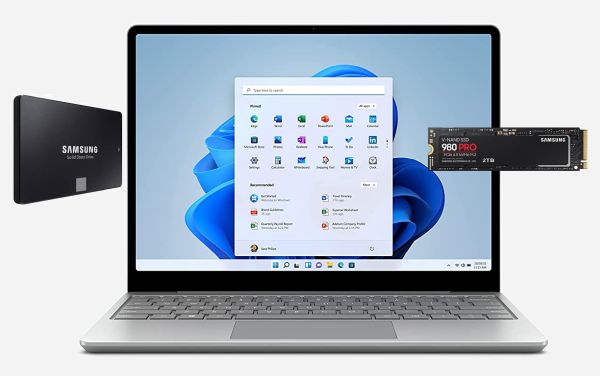The End of HDDs in Windows 11 PCs
When you buy a new computer these days, chances are they come with an SSD instead of an HDD. The benefits of an SSD over an HDD are mainly speed and reliability. Although prices for SSDs have come down, they are still more expensive than HDDs (for identical storage sizes of course). But we might still soon see the end of HDDs in new PCs as far as they are delivered with Windows 11 pre-installed. See our first look at Windows 11 to learn more about the new Windows version.
HDD vs SSD
Traditionally, HDDs were the standard for most PCs. But with disk interfaces changing (IDE, SATA, SCSI, and a number of variations) the possible transfer speeds have increased. HDDs were pimped up to use higher rotation speeds (RPM) to up the performance. The concept of spinning platters that use magnetism to store data, however, has a drawback of reliability.
Starting with portable computers, SSDs become more accepted as the preferred storage device. Not only are they faster, and more reliable (no moving parts), but they also use less power than traditional HDDs and have become much smaller in physical dimension. With new disk interfaces developing, PCIe and M.2 to be specific, the transfer rates for SSDs have gone up even more. That helps the latest SSD technology, NVMe to maximize performance.
Why still HDDs?
The main reason for PC manufacturers to still use HDDs in their products is price. The cost per gigabyte is still significantly lower for HDDs compared to SSDs. One main reason for this is the fact that SSDs use memory devices (chips), where availability and price can vary a lot depending on the chip industry. Shortages based on economic and global developments have an immediate impact on the price.
The cost per gigabyte also means that if a larger storage device is needed (several TB), the decision to use an SSD over an HDD needs to be really justifiable.
Disk requirements in Windows 11
Windows 11 does not have any specific requirements for the storage type. The only requirement is that a minimum of 64 GB of storage space needs to be available.
But if we look at the feature-specific requirements for Windows 11, we see that the Windows Subsystem for Android™ and the DirectStorage features both require a solid-state drive. In the case of DirectStorage, the requirement is even for a NVMe SSD.
So only for these optional features, an SSD is required. Despite this, it seems that Microsoft is pushing OEMs to only use SSDs in their new PCs that come pre-installed with Windows 11. Of course, this makes sense from their perspective, since the SSD as a boot device will make the whole Windows 11 usage experience better since performance is better.
Since Windows 11 is becoming the standard for new PCs more and more, Microsoft was pushing for a 2023 deadline with OEMs to only use SSDs. As always, these things are about money, so it will be interesting to see if this deadline will be possible. A lot will depend on future price development for SSDs.
Which laptop for Windows 11
If you are looking for a new Windows 11 laptop, we recommend the Dell XPS 15 at the moment, as it is one of the best overall laptops. Need a smaller model? Consider the XPS 13 model. Both not only come with an Intel 11 generation CPU, but they are available with M.2 SSDs on a PCIe NVMe interface with up to 2 TB in space.



Thank you. It works.
@Fritz Liessling - Thank you for your feedback. I understand that you are looking for other resolutions, but within Windows…
Although the answer to this question is correct, it is really a cop-out answer. It's easy enough to find answers…
To the pcauthorities.com administrator, You always provide useful links and resources.
???? ?? ??? The Last of us